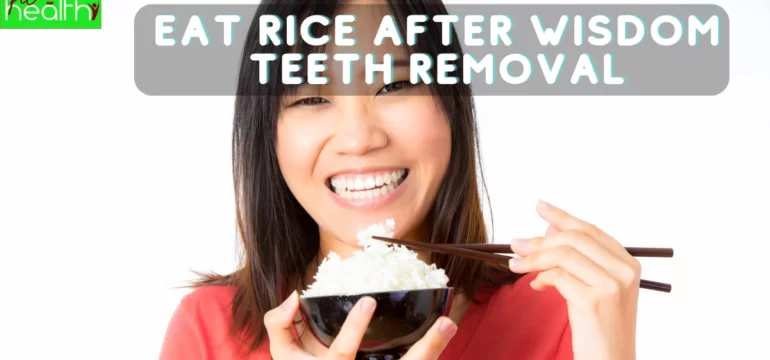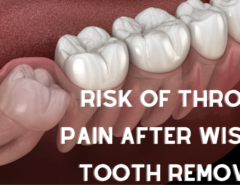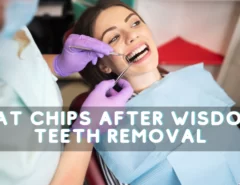After wisdom teeth removal, your mouth may feel as if it’s been hit by a truck, and you probably won’t feel up to eating anything heavy or hard. You might be wondering, then, can you eat rice after wisdom teeth removal, and the answer is yes! In fact, rice can actually help ease some of the pain you’re experiencing after surgery, thanks to its soft consistency and mild flavor. Take note of these tips before eating rice after wisdom teeth removal so that you can do so safely and comfortably.
How Many Teeth Did I Lose?
Most people have four wisdom teeth, but it’s not uncommon to have more or fewer. If you have all four wisdom teeth removed, that’s considered a full extraction. Partial extractions are also common, and your dentist will determine how many teeth need to be removed based on an x-ray. The time of recovery is dependent on the number of teeth extracted.
For example, if you have one tooth pulled, the healing process could take up to two weeks; if three teeth are pulled, the healing process could take about six weeks. It depends on what kind of dental work was done and whether or not other oral surgery was involved as well.
What Happens if I Don’t Eat Rice?
If you don’t eat rice, you may not get the full benefit of the nutrients your body needs. Additionally, you may miss out on important antioxidants and phytochemicals that can help protect your teeth and gums. Not eating rice can also lead to gum disease and tooth decay.
If you don’t eat rice, you may be at risk for malnutrition. Malnutrition can lead to a number of health problems, including: anaemia, weakened immune system, slowed growth and development, and more. Additionally, not eating rice can cause constipation and other digestive issues. So it’s important to make sure you’re getting enough rice in your diet!
How Long Do I Have to Avoid Eating Brown Foods?
Depending on the type of surgery you had, your recovery time may vary. For example, if you had impacted wisdom teeth removed, you’ll likely need to wait longer before eating anything other than liquids and soft foods. On the other hand, if your surgery was less invasive, you may be able to eat rice and other softer foods sooner. As always, it’s best to follow your dentist’s or surgeon’s recommendations.
Most will recommend waiting at least a week before starting solid food again, but this varies depending on the severity of your procedure. Your doctor will also tell you how long you have to avoid eating certain types of food like tomatoes, broccoli, peppers, and others as well as what types of food are safe for consumption after surgery.
Is it Bad to Avoid Eating Brown Foods for Long Periods of Time?
Brown foods are more likely to get stuck in your teeth than white foods, and that can lead to cavities. If you’re avoiding brown foods because you’re worried about getting cavities, you may want to reconsider. Brown rice is actually good for your teeth, and it can help prevent cavities. Eating other types of grains like wheat, oats, or barley can also be helpful.
Final Thoughts on Removing Wisdom Teeth and Not Eating Rice
It is generally safe to eat rice after wisdom teeth removal. However, you should avoid eating hard foods or anything that could potentially get stuck in your teeth. If you have any pain or discomfort, be sure to consult with your dentist. They will be able to give you specific instructions on what to do and what to avoid.
Also remember not to put a straw into your mouth while drinking as this can push the food back into the hole where the tooth was removed. When it comes to food, remember to stick with softer items like pasta, mashed potatoes, oatmeal etc., and drink lots of water so that the sutures don’t dry out.
Also Read:- Can I Brush My Teeth After Wisdom Teeth Removal?
FAQ’s | Can You Eat Rice After Wisdom Teeth Removal
Is it OK to eat rice after tooth extraction?
Yes, it is perfectly fine to eat rice after wisdom teeth removal. In fact, eating rice can help speed up the healing process by providing your body with the nutrients it needs to repair the damage caused by surgery.
Can you eat rice after 7 days of wisdom?
It is generally recommended that you avoid eating rice for at least the first week after wisdom teeth removal. This is because rice can get stuck in the sockets where your teeth were removed, which can delay healing and lead to infection.
Can rice cause dry socket?
It’s possible that eating rice could cause dry socket, which is a condition that can occur after wisdom teeth removal. Dry socket happens when the blood clot that forms in the empty tooth socket becomes dislodged, exposing the bone and nerves.
What happens if food gets in your wisdom tooth hole?
It’s normal to be concerned about what will happen if food gets in your wisdom tooth hole. The good news is that it’s not a big deal. Your wisdom teeth are simply extra teeth that most people have removed because they’re unnecessary. And, like any other tooth, they have a hole in the center that allows food and bacteria to enter. However, unlike other teeth, wisdom teeth are difficult to clean because they’re so far back in the mouth.
Can I eat Chinese noodles after wisdom teeth removal?
Yes, you can! In fact, soft foods are actually recommended for the first few days after your surgery. So go ahead and enjoy your favorite comfort foods. Just be sure to avoid anything hard, crunchy, or sticky.
When can I eat French fries after wisdom teeth removal?
It is generally recommended that patients wait at least 24 hours after wisdom teeth removal before consuming anything other than liquids or soft foods. Patients should avoid hard and sticky foods like apples, bananas, and carrots as well as crunchy snacks like chips, French fries and pretzels for the first few days.
How do you know when a blood clot falls out?
A blood clot falling out is a sign that the healing process is complete and that the hole in your gums has closed. If you have any pain or discomfort, please contact your dentist.
Do stitches prevent dry socket?
It’s important to keep the area around your stitches clean and dry to prevent infection. Dry socket is a complication that can occur after wisdom tooth removal, but it’s not common. If you’re concerned about dry socket, talk to your dentist or oral surgeon.
Also Read: When Can I Eat Chips After Wisdom Teeth Removal
What can I eat 3 days after oral surgery?
It is important to eat healthy foods that are soft and easy to chew to promote healing. Try incorporating these foods into your diet: oatmeal, applesauce, mashed potatoes, soup, eggs, and fish.
How do you get rice out of wisdom teeth holes?
It’s best to avoid eating rice for a few days after wisdom teeth removal. If you must eat it, be sure to flake it into small pieces and chew slowly. It’s also important to drink plenty of water to avoid getting dehydrated.
Can I eat mac and cheese after wisdom teeth removal?
You may be wondering what you can and can’t eat after wisdom teeth removal. While your mouth heals, it’s important to eat soft foods that are easy to chew. This means avoiding hard, crunchy, or sticky foods. So, can you eat mac and cheese after wisdom teeth removal? Yes! Mac and cheese is a great option for someone who just had their wisdom teeth removed. It’s soft, creamy, and easy to chew. Plus, it’s delicious!




